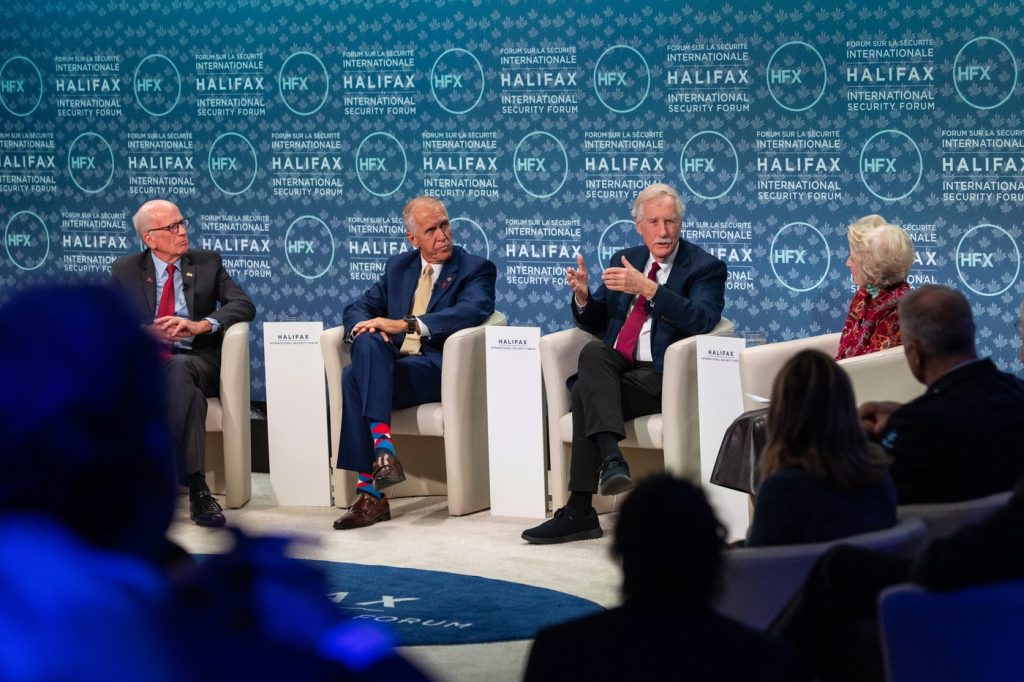HALIFAX — The economic repercussions of the tariffs imposed on Canada by U.S. President Donald Trump are evident, but the concern extends beyond mere financial impact. U.S. Senator Angus King from Maine expressed that he is particularly worried about the evolving personal and cultural perceptions Canadians hold towards Americans. Speaking at the annual Halifax International Security Forum on November 22, 2025, King highlighted the deepening cultural divide, noting that Canadians increasingly view Americans not as friends and neighbors, but as adversaries.
The Halifax International Security Forum, which commenced on November 21, 2025, has drawn over 300 delegates globally, including politicians, academics, government officials, military leaders, and representatives from non-government organizations. The focus of this year's conference is on democracy, yet questions regarding the state of Canada-U.S. relations ignited a passionate debate during the session where King and three other American politicians discussed their country's global position.
King, who serves as one of only two Independents in the U.S. Senate, expressed particular concern about the strained relations, especially considering his state’s close geographical ties to New Brunswick and Quebec. He lamented the fact that people from his state have to cross the border even for minor things like a haircut, characterizing it as a sad state of affairs. King criticized the tariffs as 'ridiculous,' arguing that they offer no tangible benefits to the United States.
In response to King’s comments, Republican Senator Thom Tillis from North Carolina acknowledged the long history of trade disputes between Canada and the U.S. and emphasized the family's shared democratic values. However, Tillis quickly shifted the focus to what he termed Canada’s failure to fulfill its financial obligations to NATO, asserting that Ottawa still owes the military alliance upwards of $300 billion. He remarked, “Every prime minister has said the same thing, 'We’re going to get to it,' and they never got to it,” suggesting a lack of commitment from Canadian leadership regarding NATO responsibilities.
Despite the criticism, former California Congresswoman Jane Harman defended Canada’s recent commitment to increasing defense spending. She pointed out Prime Minister Mark Carney's announcement of a plan to enhance defense spending by $9 billion by March of the following year, aiming to elevate the defense budget to two percent of Canada’s GDP. Still, Tillis dismissed this pledge, stating that such commitments should also account for past shortcomings.
Senator Kevin Cramer, representing North Dakota, supported King’s assertion regarding the cultural rift between the two nations. Cramer mentioned that this tension has resulted in a significant decrease in Canadians traveling to the United States for leisure activities, particularly highlighting reduced shopping and hotel stays in North Dakota, where such tourism is particularly important. He noted, “Those numbers are down because people are angry,” emphasizing a sentiment of estrangement.
Despite these concerns, Cramer expressed optimism that constructive resolutions could emerge. He stated, “Our relationship with Canadians is very personal,” and emphasized that the best course of action would be to return to the negotiating table to address trade issues. Cramer suggested that both Canadians and Americans are eager to restore their cooperative relationship.
This exchange at the Halifax International Security Forum illustrates the complex dynamics of Canada-U.S. relations and highlights the multifaceted implications of current trade disputes. The ongoing dialogues reflect not only economic considerations but also the deep-rooted cultural connections and perceptions that shape the interactions between these two neighboring countries.











